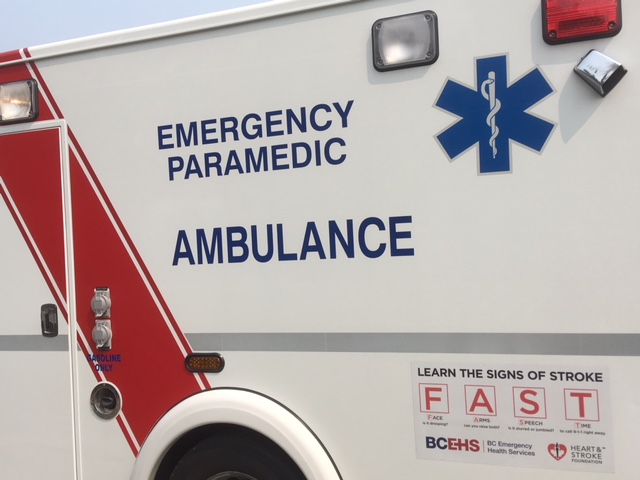The province is looking to enhance its ambulance service, with a focus on rural and remote locations.
In October, 24 ambulance stations will be converted from on-call paramedic staffing to 24/7 stations with eight full-time paramedics.
Vancouver Island communities benefiting include Lake Cowichan, Port McNeill, Tofino, Cumberland, and Bowser.
As well, 26 smaller stations moving to a scheduled on-call staffing model are getting more permanent, regular paramedic jobs, starting on Nov. 1st.
Island communities seeing this enhanced service include Alert Bay, Cortes Island, Port Alice, Port Clements, Sayward, Sointula, Tahsis, Texada Island, Wells and Zeballos.
“When we call 911 for help, British Columbians need to feel confident that help is on the way and that it will arrive quickly,” said B.C. health minister Adrian Dix.
“The significant progress made by BC Emergency Health Services over the summer will ensure a more effective ambulance service for patients and families who depend on it. Better support for paramedics and dispatchers will help them do the vital work we count on every day.”
As well, B.C. is also hiring 30 new full-time dispatchers, province-wide; reconstituting the BCEHS board to focus solely on ambulance services; and establishing and appointing a new chief ambulance officer responsible for the day-to-day management of the BC Ambulance Service.
BCEHS, under Leanne Heppell is the interim chief ambulance officer. She’ll be rolling out changes to its staffing model throughout the province, with a goal of improving services to patients and stabilizing paramedic staffing, especially in rural and remote communities.
The hiring of the 85 new paramedics and 30 new dispatchers is underway. The positions are expected to be filled between October and December. This is in addition to 295 full-time and-part-time paramedic positions posted by BCEHS in early July.
Further to this work, Heppell has been working with paramedic and dispatch leaders to ensure BCEHS is fully prepared for hotter weather and periods of high demand.
According to the province, measures instituted to date include:
- ensuring flexibility in staffing and resource adjustments as needed;
- increased clinical support in BCEHS dispatch centres to help triage and manage calls;
- 24/7 manager support in dispatch to help with delays and escalation, and increased manager support for front-line paramedics in the field;
- introducing new low-acuity patient transport units (patient vans) for Metro Vancouver and the Fraser Valley to transport less urgent patients and ensure ambulances are available for high-acuity patient response; and
- working with health authorities to reduce ambulance turnaround times to help paramedics get back on the road and respond to calls faster.
Since 2017, the BCEHS annual budget has increased from $424.25 million to $559.12 million, doubling the average annual spending.





